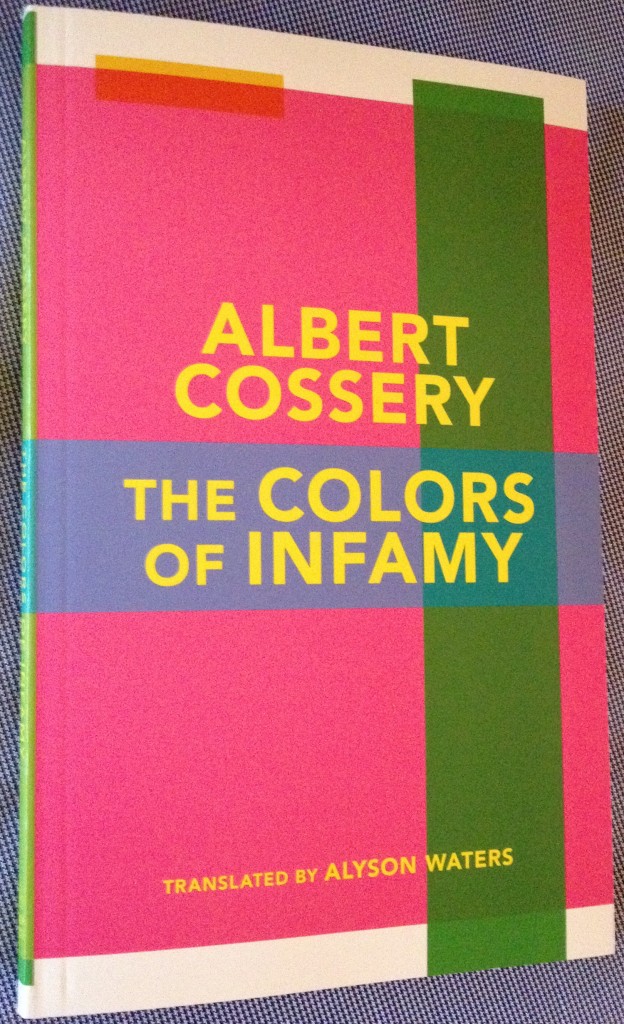.
.
Work produced in the final stretch of an artist’s career often displays the creator’s sense of freedom at the close. Simplicity, accessibility, brevity, lightness, and an avoidance of the over-determined often characterize these autumnal works. In the field of painting, think of the airy ribbons of primary colors on pure white fields in Willem DeKooning’s late period works, or the floating colored paper cut-outs of Matisse’s final years. Among writers, consider the lighthearted last novel of William Faulkner, “The Reivers” (reiver is an old-fashioned term for a raider, plunderer, or thief), and the joy Thomas Mann clearly had in sketching the progress of the morally flexible young hero of “Confessions of Felix Krull, Confidence Man: The Early Years,” the novel left unfinished at the time of his death at age 80.
Put Albert Cossery’s “The Colors of Infamy” (Les Couleurs de l’Infamie) in that category. Written at age 85 after a decade and a half of silence since his previous publication, this final work, the shortest of his novels, fills a mere 92 pages. It offers a sketch of his constant themes and a handy summation of his lessons. Except for the very serious questions it touches upon, I would call it a light entertainment. All in all it provides a good entry point for new readers interested in sampling “the Voltaire of the Nile.”
On the streets of Cairo we follow three characters, each in his own way an outcast from society. Ossama is an educated but unemployed 23-year-old who has chosen to become a high-class pickpocket. He “instinctively grasped the flaw of a society based on appearance,” and so he dresses richly to more easily prey on wealthy marks, not unlike the con-man Felix Krull who learns that society operates under the premise that illusion is reality. Nimr is Ossama’s street-smart teacher in the thieving trade, and is somewhat affronted that Ossama has gone upscale. Karamallah is a middle-age writer and intellectual whose rebellion against the corrupt system has led to imprisonment followed by exile to his family’s mausoleum. The book’s slender plot gains motion when these three come together to decide how best to confront an injustice. A shoddily constructed apartment building recently collapsed, leaving 50 dead, and Ossama acquires an incriminating letter that firmly assigns culpability for the horror to a powerful real estate developer. What’s to be done with such knowledge?
The open-ended discussions these three engage in include age-old questions. Is it possible to be virtuous and become rich? Is the world complicated and absurd — an idea “dreamed up by illustrious thinkers from cold climes” — or does the world still possess an “Edenic simplicity” of a kind that all men can enjoy, as Cossery’s stand-in, Karamallah, believes? Is happiness within our reach? And to speak of an issue of critical importance to societies aspiring to fairness and equal opportunity: Is business “unimaginable without corrupt networks”?
This is a novel of ideas that will impress you with its contemporary resonance. I was immediately startled by the opening pages of this 1999 novel, when Ossama surveys a bustling Tahrir Square and wonders about the future of its denizens (the author unaware the site was to be transformed during the 2011 Arab Spring into a locus of revolution). Does Cossery have something to say to an America that today is exhibiting Egypt-like traits: a growing cohort of educated but unemployed youth; a growing inequality of wealth; a growing sense that 1% have inordinate power over the fate of the other 99%? Here is a book to talk about.
The translation from the French, by Alyson Waters, is excellent, smoothly capturing Cossery’s rich and elegant prose. For those interested in reading an insightful online interview with the translator, Google the phrase, Alyson Waters on the Colors of Infamy. Some may find Cossery’s prose old-fashioned or overwrought (too adverb- and adjective-heavy), but I suspect for most it will be a respite from the inelegant prose we encounter regularly in our daily reading, especially online. Critics have noted Cossery’s prose has a Balzacian touch. This stylistic similarity is matched by the two French authors’ common view of society. Cossery adopts as a truism Balzac’s notion that behind every fortune is a crime.
As for the meaning of the book’s title, fear not: this is revealed two pages from the end.
.
A shorter version of this review is posted on Amazon.
